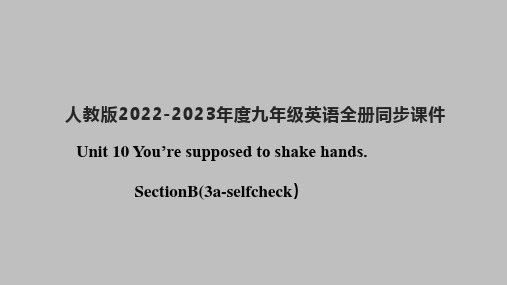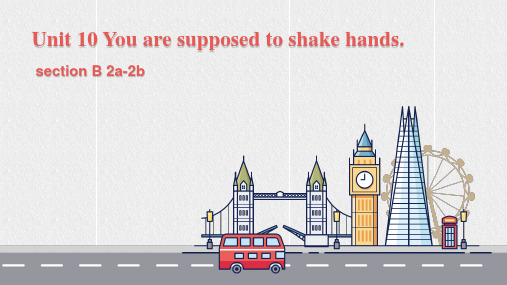人教版九年级英语unit 10单词讲义
- 格式:docx
- 大小:19.25 KB
- 文档页数:3

人教版九年级英语《Unit 10 You’re supposed to shake hands. 》Section A_教学设计1一. 教材分析人教版九年级英语《Unit 10 You’re supposed to shake hands. 》Section A主要介绍了英语中不同场合下的礼貌用语和行为规范。
本节课主要围绕着日常交际用语展开,包括如何问候、介绍、道歉、道谢等。
教材通过丰富的情景对话和图片,帮助学生理解和掌握这些交际用语,提高他们的实际英语应用能力。
二. 学情分析九年级的学生已经具备了一定的英语基础,能够理解和运用一些基本的英语交际用语。
但是,他们在实际应用英语进行交际时,往往会因为害羞、自信心不足等原因而产生紧张和焦虑情绪,影响他们的交际能力。
因此,在教学过程中,需要注重培养学生的自信心,鼓励他们大胆开口说英语。
三. 教学目标1.知识目标:学生能够掌握本节课所学的日常交际用语,如问候、介绍、道歉、道谢等。
2.能力目标:学生能够在实际情景中运用所学的交际用语,提高他们的英语交际能力。
3.情感目标:通过本节课的学习,学生能够更加自信地使用英语进行交际,培养他们的跨文化交际意识。
四. 教学重难点1.重点:学生能够掌握并熟练运用日常交际用语。
2.难点:学生能够在实际情景中灵活运用所学的交际用语,并进行有效的交际。
五. 教学方法1.情境教学法:通过设置不同的情景,让学生在实际语境中学习和运用英语交际用语。
2.交际法:鼓励学生积极参与课堂交际活动,提高他们的英语交际能力。
3.任务型教学法:通过完成各种任务,让学生在实践中学习和运用所学的交际用语。
六. 教学准备1.教学课件:制作课件,包括文本、图片、音频等素材,以便于教学展示。
2.教学道具:准备一些日常交际用语相关的道具,如名片、礼物等,以便于课堂操练。
3.教学资源:收集一些关于日常交际用语的视频素材,用于课堂拓展。
七. 教学过程1.导入(5分钟)利用学生日常生活中的一些交际场景,如问候、介绍等,引导学生思考和讨论这些场景下应该如何用英语进行交际。





Unit 10You're supposed to shake hands.1.be expected to do被预期会做……expect的被动形式后面加不定式,意为“被预期会做……”。
如:①He is expected to arrive at five in the afternoon.预期他将会在下午五点到达。
②My teacher is expected to come to the party today.预计我的老师会参加今天的聚会。
③He studies hard these days, and he's expected to do well in the exam.他最近学习很用功,预计他能在考试中取得好成绩。
2.It's very important to be on time.准时很重要。
(1)important是形容词,常用句式是It's important (for sb.) to do sth.。
如:It's important for us to learn English well.对我们来说学好英语是重要的。
(2)如果只是说“对某人是重要的”,可以用be important to sb.。
如:Knowing Western customs is important to us.了解西方习俗对我们很重要。
3.I greeted Paul's mother the wrong way.我用错误的方式问候保罗的母亲。
greet意为“问候;向……打招呼”。
如:①He greeted her by saying “Good morning”.他向她打招呼,说“早上好”。
②She greeted me with a friendly smile.她向我微笑致意。
③A beautiful view greeted us.美丽的景色呈现在我们的面前。
Unit 10: You^re supposed to shake hands.Part 1: Teaching Design第一部分:教学设计Period 1: Matching,Listening and Speaking(What are people supposed to do...?)Objectives•To learn to understand and use supposed to + infinitive•To listen and speak what you are supposed to doProcedures■ Warming up by studying the title “Yoifre supposed to shake hands?9Hello, class・ Is there anyone who is late for school today? I see Li Jianshe is late・ He is not here yet. You have to be here for class before the bell ring・ That is to say you are supposed to be on time for school. By the way do you know what I mean by saying "you are supposed to be on time for school 二be supposed to...其中to是动词不定式符号,不是介词,其后要跟动词原形。
当be supposed to...的主语是“人”时,意为“应该……”;“被期望……”,它可以用來表示劝告、建议、义务、责任等,相当于情态动词should。
如:Everyone is supposed to wear a seat-belt in the car.每个人在汽车里都应该系安全带。
人教版九年级英语单词讲义
Unit10
1.custom / ˈkʌstəm / n. 风俗;习俗It is a custom in that country for woman .对于这个国家的女人来说这是个习俗。
2.bow / baʊ / v. 鞠躬He bowed to his parents.他向他的父母鞠躬。
3.kiss / kɪs / v. & n. 亲吻;接吻kiss goodbye吻别
4.greet /ɡri:t/v. 和⋯⋯打招呼;迎接=say hello great_______ greet each other互相问候
5.relaxed /rɪˈlækst/ adj.放松的;自在的He looks relaxed and confident.他看起来放松,自信。
6.value / 'vælju: / v. 重视;珍视n. 价值I value our friendship very much.我珍视我们的友情。
形容词valuable有价值的
7.drop by 顺便访问;随便进入drop in拜访某地某人drop out辍学
a drop of water一滴水
8.capital / 'kæpɪtl / n. 首都;国都Beijing is the capital of China.北京是中国的首都。
cap帽子
9.after all 毕竟;终归After all he is still a schoolboy. 他终归是个小学生。
10.noon / nu:n / n. 正午;中午We should be there by noon.中午之前我们应该到哪里。
afternoon______
at noon >1天,用_______________ =1天,用____________ <1天,用_______
11.m ad / mæd / adj. 很生气;疯的I got mad when I heard the bad news.我听到这个不好的新闻很生气。
get/be mad______________ news( )____________ Madam________
12.get mad 大动肝火;气愤
13.effort /ˈefət / n.努力;尽力He made an effort to climb the tree.他努力爬树。
make an effort to do sth.______
14.make an effort 作出努力
15.passport / 'pɑ:spɔ:t/n. 护照pass通过+port表地点的后缀Please,show me your passport.让我看一下你的护照。
show:______________show sb.sth./show sth. to sb._______show around______
talk show_________
talent show__________
16.clean…off 把…擦掉I cleaned the mud off my shoes.我把我鞋子上的泥擦掉。
17.chalk / tʃɔ:k /n. 粉笔There is a box of colored chalks in the classroom.教室里有一盒彩色粉笔。
two boxes of ________ there be遵循:________________将来时:there will be/be going to 不与____________连用
18.blackboard / ˈblækbɔ:d / n. 黑板The teacher knocked on the blackboard to catch our attention.老师敲黑板为了引起我们的注意。
knock on_________ to catch不定时做目的状语catch one’s attention__________
pay attention to:_______________
19.northern n/ adj. 北方的;北部的north+ern west________ east________south________
20.coast / kəʊst / n. 海岸;海滨We walked along the coast for five miles.我们沿着海岸走了五英里。
21.season / ˈsi:zn / n. 季;季节There are four seasons in a year.一年有四季spring________summer________
autumn/fall____________ winter___________
22.knock / nɒk / v. 敲;击n.敲击声;敲击
23.eastern / ˈi:stən / adj. 东方的;东部的east+ern west______ south_________ north______
24.take off 脱下(衣服);(飞机等)起飞The plane is about to take off. 飞机就要起飞了。
be about to do sth.___
Do take off your coat, please. 请脱下你的外套。
25.worth / wɜ:θ/ adj. 值得;有⋯⋯价值(的)worth doing sth._________________
26.manner / ˈmænə(r) / n. 方式;方法(pl.) 礼貌;礼仪Being on time is considered good manner.守时被视为一个好的礼仪。
table manners__________ be+动词的过去分词__________________
27.empty / 'emptɪ / adj. 空的;空洞的反义词:full full of= be filled with____________
28.basic / 'beɪsɪk / adj. 基本的;基础的
29.exchange / ɪks'tʃeɪndʒ / n. & v. 交换ex(前,另外)+change(改
变)
30.go out of one’s way 特地;格外努力
31.make ... feel at home 使(某人)感到宾至如归Sit down and make yourself at home.请坐,随便吃喝。
32.teenage / 'ti:neɪdʒ / adj.十几岁的;青少年的teen+age Teenages like doing sprots.
33.granddaughter / ˈgrændɔ:tə(r) /n. (外)孙女grand+daughter grandparent________
34.behave / bɪ'heɪv / v. 表现;举止He behaved like a gentleman.他表现的像绅士。
35.except /ɪk'sept/ prep. 除⋯⋯之外conj. 除了;只是(除了不包括)We work every day except weekends.除了周末以外,我每天工作。
besides (除了还包括)Besides English, he has to study German and French. 除英语外,他还要学德语和法语。
36.elbow / 'elbəʊ / n. 肘;胳膊bow__________
37.gradually / ˈgrædʒuəli / adv. 逐步地;渐进地The weather gradually improved.
38.get used to 习惯于be/get/become used to doing sth.____________________ used to do sth._________
39.suggestion / səˈdʒestʃən /n. 建议(可数名词) advice建议(不可数)Can you give me some suggestions/advice?
Brazil 巴西
Mexico 墨西哥
Cali 卡利(哥伦比亚城市)
Colombia VmbI 哥伦比亚(南美洲国家)
Lausanne 洛桑(瑞士城市)
Norway weI挪威。